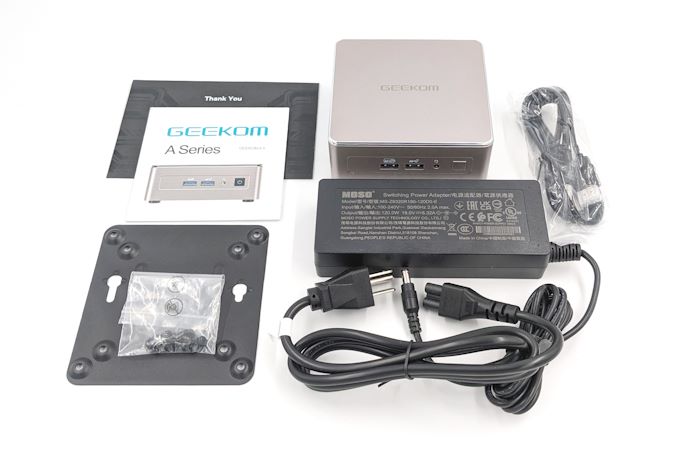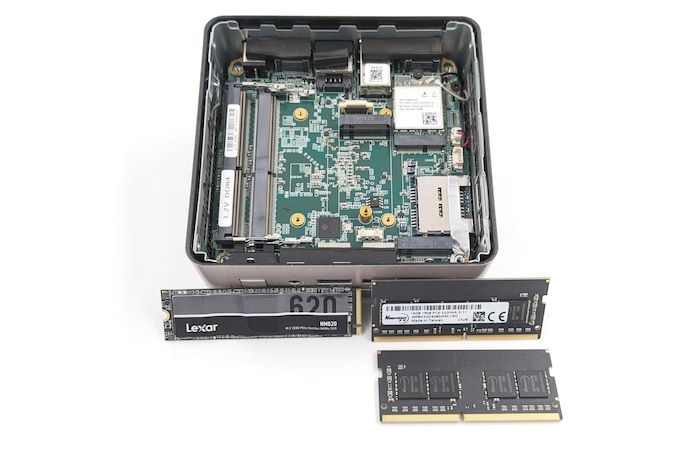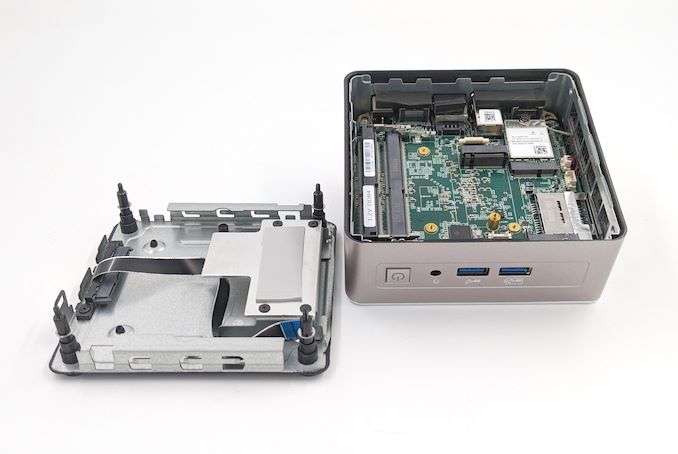GEEKOM A5 mini-PC Review: Affordable Cezanne Zen 3 at 35W
by Ganesh T S on December 8, 2023 9:15 AM EST
The introduction of the Intel NUC in the early 2010s kickstarted the ultra-compact form-factor (UCFF) trend for desktop systems. Processors with TDPs ranging from 6 - 15W formed the backbone of this segment in the initial years. Intel and AMD have been officially allowing configurable TDPs for their notebook segment offerings for a few years now. This has prompted some vendors to introduce UCFF systems with regular 45W TDP processors (albeit, in cTDP-down mode).
GEEKOM, the private label brand of Shenzhen Jiteng Network Technology Co., has been on a roll lately with the introduction of multiple UCFF systems in the last year. The brand has become an avenue for the company to market excess inventory from their OEM / ODM production runs. As a result, we are seeing the introduction of fully configured systems based on older CPU generations, but at extremely attractive price points. The GEEKOM A5 is one such product.
The system is available in only one configuration - a Ryzen 7 5800H CPU along with a 512 GB SSD and 32 GB of RAM. The company sent that over to put through our evaluation routine for small form-factor computing systems. This review explores the performance profile and value proposition of the system, along with a discussion of factors that might tempt consumers to opt for it despite the use of a processor from early 2021.
Introduction and Product Impressions
Small form-factor (SFF) systems are replacing bulky desktops for many use-cases. The rapid growth in this segment has led to the rise of many Asian vendors focusing on these systems. GEEKOM is a private label brand of Shenzhen Jiteng Network Technology Co., Ltd. - an OEM / ODM for small form-factor computing systems. The company manufactures both Intel and AMD-based systems. The private label started off with a few entry-level systems (such as the MiniAir 11) , but has since branched out to introduce machines with leading-edge processors. We recently took a look at their Raptor Lake-H-based Mini IT13, but the focus today is on the GEEKOM A5. This system is equipped with a relatively old AMD Cezanne SoC from early 2021.
The Ryzen 7 5800H in the GEEKOM A5 has eight cores and sixteen threads, with a Radeon RX Vega 8 integrated GPU. It is fabricated in TSMC's 7nm processor. At the time of its introduction in the 2021 CES, the SoC was slotted right in the middle in AMD's Ryzen 5000 Mobile H-series lineup.
In order to make up for the use of an old processor, GEEKOM is being very liberal with DRAM capacity (32 GB of DDR4-3200) and has also used a relatively high-performance DRAMless Gen 3 SSD (512GB of SK hynix 176L 3D TLC behind a Maxio SSD controller in the Lexar NM620). The entire package is being marketed with a sub-$400 price point - essentially less than half of what such an UCFF system would have cost, had it been purchased in 2021.
GEEKOM's package for the A5 is spartan - the main unit is accompanied by a welcome card, VESA mount with associated screws, an installation guide, HDMI cable, and a 120W (19V @ 6.32A) AC adapter with a geo-specific power cord.
The main unit clocks in at 117mm x 112mm x 49.2mm. The system is sized to accept a 2.5" drive. The case design is essentially the same as the Mini IT13. The form-factor is meant to deliver functionality similar to the full-height mainstream NUCs. The larger dimensions allow for a wider variety of ports in the systems compared to regular UCFF systems that forego the 2.5" drive support.
GEEKOM does not sell barebones versions of the A5. A SSD, DRAM, and a pre-installed copy of Windows 11 Pro are also provided.
Unlike the other AMD-based GEEKOM system we had reviewed before, the board and chassis design are fairly straightforward and similar to the NUCs.
The DDR4 SODIMM slots and the Gen3 x4 M.2 SSD slots on the motherboard are pre-populated in the GEEKOM configuration. The WLAN / BT module is under the NVMe SSD slot (similar to the mainstream NUCs). There is a metal frame that is built around the 2.5" drive slot, and a thermal pad is affixed to it to provide heat transfer support from the M.2 2280 NVMe SSD. Our review configuration was equipped with 2x Shenzhen Wodposit Tech. WPBH32D408SWM-16G DDR4-3200 SODIMMs and a Lexar NM620 (2023 model) Gen3 x4 M.2 2280 NVMe SSD. Windows 11 Professional came pre-installed.
The full specifications of the review sample (as tested) are summarized in the table below. The Ryzen 7 5800H has a TDP of 45W, and a minimum power (cTDP-down) of 35W. As we shall see in our BIOS options analysis and detailed investigation into the thermal characteristics in a later section, the form-factor of the system and the notebook-style thermal solution restricts the operation of the processor to a 35W cTDP mode.
| GEEKOM A5 Specifications (as tested) |
|
| Processor | AMD Ryzen 7 5800H Zen 3 (Cezanne) 8C/16T, 3.2 - 4.4 GHz TSMC 7nm, 16MB L3, 45W Max / Target TDP : 45W / 35W |
| Memory | Shenzhen Wodposit Tech. WPBH32D408SWM-16G DDR4-3200 SODIMM 22-22-22-52 @ 3200 MHz 2x16 GB |
| Graphics | AMD Radeon Graphics (Renoir) - Integrated (RX Vega 8) (8 CUs @ 2.4 GHz) |
| Disk Drive(s) | Lexar NM620 (512 GB; M.2 2280 PCIe 3.0 x4 NVMe;) (SK hynix 176L 3D TLC; Maxio MAP1202A-F1C Controller) |
| Networking | 1x 2.5 GbE RJ-45 (Realtek RTL8125) Realtek 8852BE Wi-Fi 6 (2x2 802.11ax - 1.8 Gbps) / Bluetooth 5.2 |
| Audio | Realtek ALC269 (3.5mm Audio Jack in Front) Digital Audio with bitstreaming support over HDMI and Type-C |
| Video | 2x HDMI 2.0 (4Kp60) 2x Display Port 1.4 over USB4 Type-C (8Kp30) |
| Miscellaneous I/O Ports | 2x USB 3.2 Gen 2 Type-A (Front) 2x USB 3.2 Gen 2 Type-C w/ DP-Alt Mode (Rear) 1x USB 3.2 Gen 1 Type-A (Rear) 1x USB 2.0 Type-A (Rear) 1x SDXC UHS-II Slot (Side) |
| Operating System | Windows 11 Enterprise (22621.2506) |
| Pricing | (Street Pricing on Dec 7th, 2023) US $399 (as configured, with OS) (USD 359 with $40 off coupon code anandtecha540) |
| Full Specifications | GEEKOM A5 Specifications |
The next section details the the various BIOS options and follows it up with a detailed platform analysis.













35 Comments
View All Comments
Reflex - Monday, December 11, 2023 - link
This is just a bizarre comment. These systems have a near top end CPU from the previous generation and can have up to 64GB of RAM. The vast majority of PC's sold are around 16GB of RAM and nobody complains about that (and this mini PC has twice that). Yes, web browsers can eat up a lot of memory, but regardless regular people and even many power users who aren't gamers are well served by these.As much as I love my overbuilt ITX system the fact is that I could get by on one of these things fine for everything but gaming, and I usually have 3 browsers open with dozens of tabs in each (guess what? Browsers hibernate tabs not in use), I do photo editing via Capture One and run a ton of messaging apps, some work applications and a desktop AI solution and my Ryzen 5700G handles it without breaking a sweat. I have 64GB of memory, which these mini PC's can handle as well, and my memory usage is rarely more than 35-50%.
I don't know what you believe a regular user does that requires so much more than what they offer but you may need a reality check.
ballsystemlord - Tuesday, December 12, 2023 - link
As I said to another reply, I mistakenly thought the mini-PC was equipped with 16GB of RAM.t.s - Friday, December 15, 2023 - link
still, 16GB of RAM is enough for running 20 tabs or more. Well, except, like they said, you watch dual 8k vr. BTW, I'm now with 32 firefox tab, 11GB RAM usage.StevoLincolnite - Wednesday, December 13, 2023 - link
Depends on the browser and what is going on.Some browsers are known to aggressively cache data into RAM.
However 8GB of Ram+Windows+Firefox I can happily run a dozen or more tabs with a decent SSD with music streaming in the background.
garblah - Friday, December 8, 2023 - link
No AV1 decoding in hardware. Small chance it could be an issue in a few of years, though the rise of AV1 to prominence has been slow.Not sure this configuration could brute force 4K AV1 playback without dropping frames. At any rate, I don't think the highest quality streaming content will be found as AV1 for another 4 years at minimum.
garblah - Friday, December 8, 2023 - link
*I see 8K 60p AV1 was tested for CPU usage. Why 8K 60p only... hmm.Samus - Saturday, December 9, 2023 - link
Is this OS license actually legit?meacupla - Sunday, December 10, 2023 - link
Win11 pro keys cost $36 for the end user. They probably cost like $10 for geekom, who get volume discountsSamus - Wednesday, December 13, 2023 - link
Sure, except this is equipped with Windows Enterprise...that's normally reserved for corporate and site-licensing, not end-user\resale applications.Very strange.
gz-0 - Saturday, December 9, 2023 - link
The comparison with different setups shows this to be the best for value. I was surprised that Intel setups seemed so inferior to the AMD setups.Looked closely at the lower cost, lower performances of the other AMD units. This seems to be the best. My previous experiences were with a Celeron 8GB memory unit. The lack of hardware ports was treated with external plugin ports.